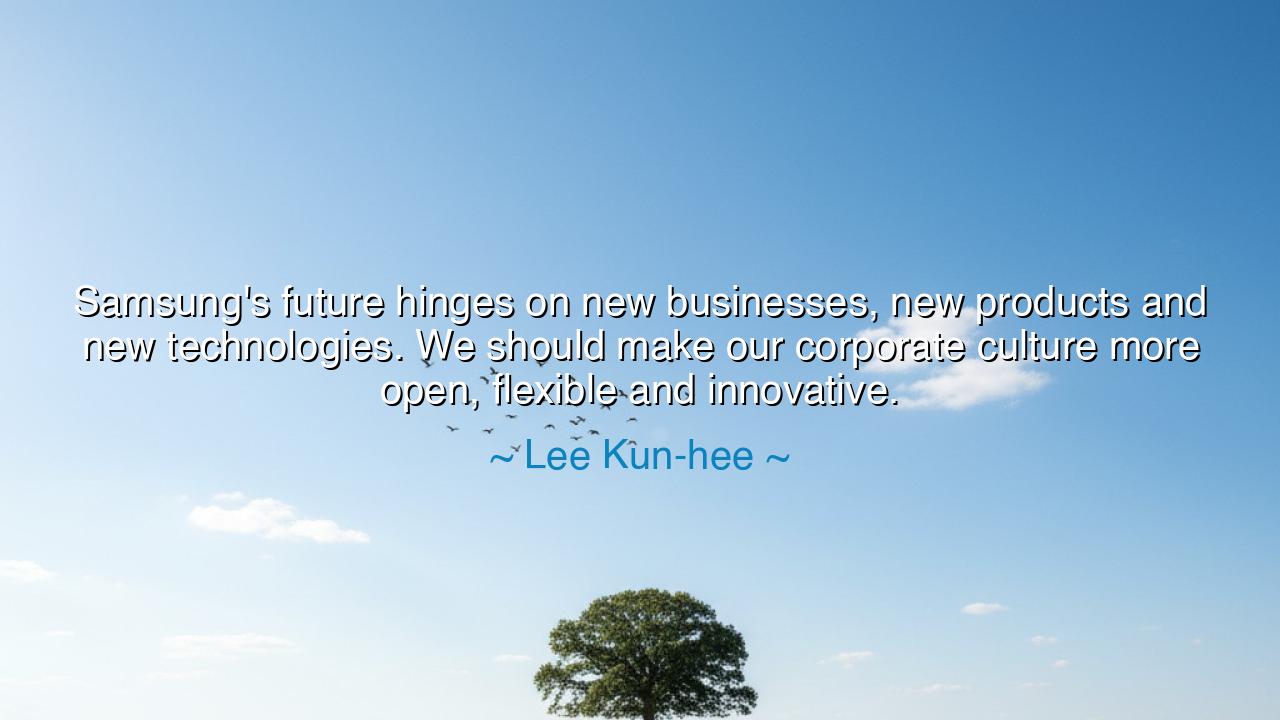
Samsung's future hinges on new businesses, new products and new
Samsung's future hinges on new businesses, new products and new technologies. We should make our corporate culture more open, flexible and innovative.






"Samsung's future hinges on new businesses, new products and new technologies. We should make our corporate culture more open, flexible and innovative." These words, spoken by Lee Kun-hee, the former chairman of Samsung, encapsulate the timeless truth that the future of any great institution rests not on the past successes, but on its ability to adapt, innovate, and evolve. Lee’s call for openness, flexibility, and innovation speaks to the very essence of progress. To ensure that Samsung remains at the forefront of technological advancement, it must not cling to the security of old systems and structures, but instead embrace a future shaped by new ideas and bold actions.
In the ancient world, the greatest empires and cultures were those that understood the need for adaptation and innovation. The Romans, for instance, rose to dominance not only through their military strength but through their ability to innovate in engineering, government, and law. They built an empire that lasted centuries by constantly improving their infrastructure, their systems of governance, and their strategies in warfare. The Roman roads, aqueducts, and the Codex of Laws are just a few examples of how the Romans embraced new technologies and methods to keep their empire strong. Their success lay in their ability to learn, adapt, and move forward, rather than resting on their laurels or clinging to outdated ways of thinking.
Lee Kun-hee’s words reflect the understanding that success—whether for a corporation, an empire, or an individual—depends on the ability to create the future rather than simply preserve the past. In his vision for Samsung, he called for a corporate culture that would not just react to change, but actively create it. This mindset is essential for anyone striving for greatness—to be a true leader is to be a pioneer, charting new courses in uncharted waters. Samsung, under Lee’s leadership, was able to take significant leaps in technology, establishing itself as a global leader in electronics. But this vision of continuous reinvention was key to ensuring the company’s success in the long term.
Consider the story of Thomas Edison, whose pursuit of innovation led to the invention of the lightbulb and the creation of a new era in human civilization. Edison did not merely rest on his initial inventions; he continued to push the boundaries of technology, constantly looking for new ways to improve and innovate. His work laid the foundation for electricity, mass production, and countless other industries that would shape the future. Edison’s relentless pursuit of progress—his willingness to take risks, experiment, and embrace failure as part of the process—is a testament to the very idea Lee Kun-hee espouses: that the future of any organization lies in its ability to innovate and reinvent itself. The lesson of Edison is that those who shape the future are those who never stop evolving, who always strive to improve, and who are willing to adapt to the changing tides of time.
Similarly, the story of Apple under Steve Jobs is a modern example of how a company’s future depends on continuous innovation. Jobs revolutionized the technology world not just through product development, but by creating a corporate culture that valued creativity, open-mindedness, and a refusal to conform to industry standards. Apple’s success was rooted in its willingness to disrupt its own market, constantly launching new products, designs, and features that shifted the direction of the tech industry. Jobs, much like Lee, understood that a company’s future would only be secured through an ongoing commitment to innovation and adaptability.
The lesson of Lee Kun-hee’s quote is clear: success is not a matter of preserving what has already been achieved, but of creating what has yet to be. For any organization—be it a corporation, a nation, or an individual—the key to lasting success lies in a commitment to innovation, openness, and flexibility. The future is shaped not by what we hold on to, but by how we embrace change and foster a culture of progress. To move forward, we must be willing to redefine our systems, to question the status quo, and to take bold action in the face of uncertainty.
In our own lives, this lesson calls us to adapt, innovate, and never stop learning. Whether we are building a business, pursuing personal goals, or contributing to our communities, the future will always belong to those who are willing to reinvent themselves. Let us not fall into the trap of complacency or fear of change, but instead approach every challenge as an opportunity for growth. Just as Samsung thrived under Lee Kun-hee’s vision, so too can we thrive when we choose to remain open, flexible, and innovative in all our endeavors. Let us embrace the future, continuously evolve, and shape the world we wish to see.






AAdministratorAdministrator
Welcome, honored guests. Please leave a comment, we will respond soon